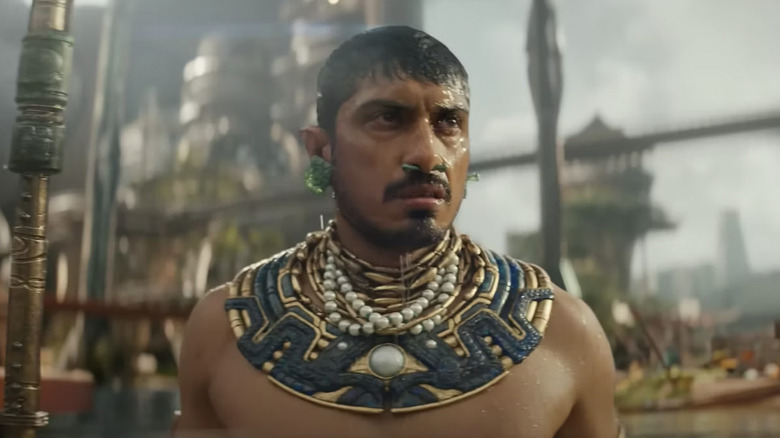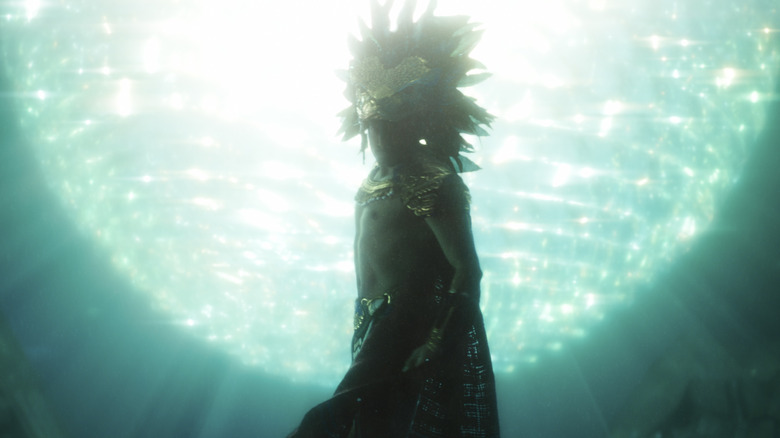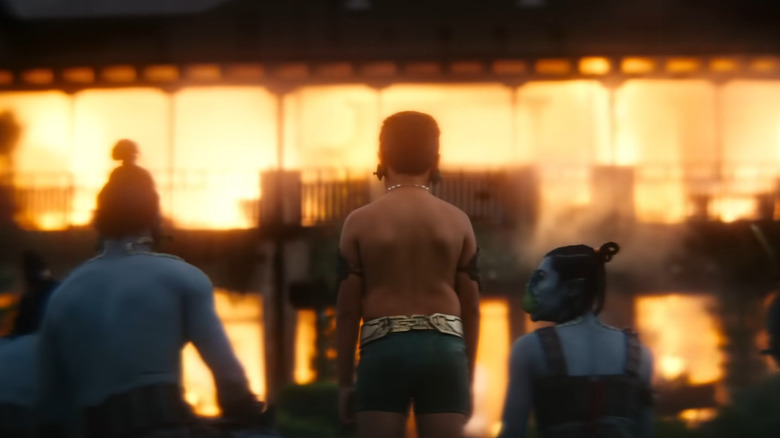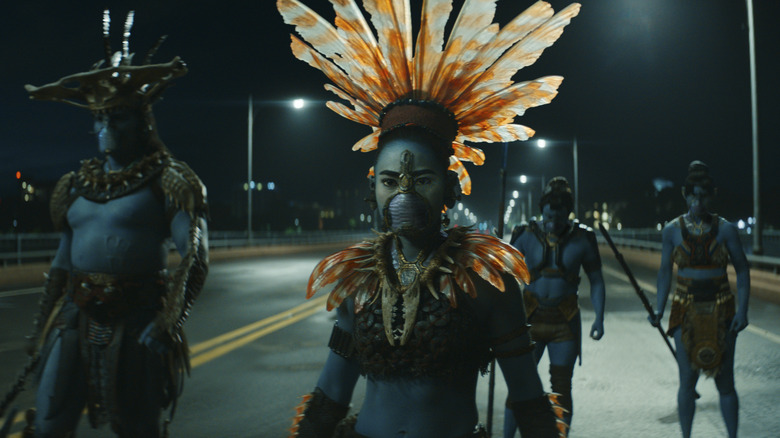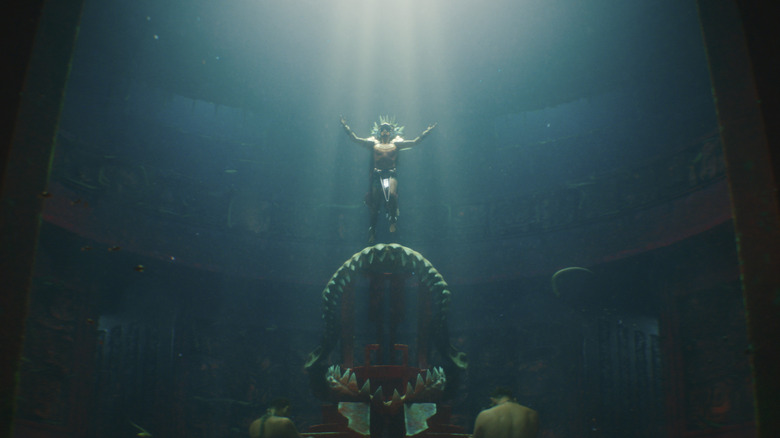Namor Is A Huge Step Forward For Hispanic And Latin Representation In The MCU
Over the past few years, Marvel Studios has strived to tell more diverse stories, pulling not only from the rich lore of their comics but also from the history of other cultures. Marvel Cinematic Universe stories such as "Eternals," "Shang-Chi and the Legend of the Ten Rings," and "Ms. Marvel" are deeply rooted in the cultures and traditions of people from around the world. The celebration of different cultures is front-and-center in the newest film in the MCU: "Black Panther: Wakanda Forever."
The first "Black Panther" film received acclaim for its story and world-building, and was the first Marvel Studios film with a Black director and predominantly Black cast. With "Wakanda Forever," Coogler uses his skills to tell the story of another underrepresented minority in the MCU. At the forefront of the film and its marketing has been the opposing force against Wakanda, Namor, and his underwater nation of Talokan. Diverging from the comics, Coogler cast Mexican actor Tenoch Huerta Mejía as Namor, giving the character an engaging new backstory and transforming Atlantis into the Mayan-inspired Talokan. With the story that Ryan Coogler and co-writer Joe Robert Cole have crafted, the MCU finally has some much-needed Hispanic and Latin representation that's tasteful and a far cry from the borderline offensive caricatures in the past.
An outsider by virtue
Namor is central to this new and exciting representation of Hispanic and Latin cultures. In the comics, Namor was never a straightforward hero or villain. Instead, the character has always been passionate about protecting his people. Lofty ideals or pursuit of power aren't the focus of Namor in "Wakanda Forever." Namor's goal in the film is to preserve his people, by way of secrecy. These motives tie into the profound representation at the heart of "Wakanda Forever," which was sorely needed in the MCU.
There have been other Latino and Hispanic actors in the MCU up to this point, with the likes of Oscar Isaac, Zoe Saldaña, and Salma Hayek. However, the movies sometimes hid the actors behind makeup, like Saldaña, and other major Latino players in the MCU weren't allowed to explore their culture at all. With Namor, his love for his people and where he comes from drives the character's motivations throughout the film. Moreover, the story of how Talokan came to be stays true to Namor's status in the comics as an outsider by virtue, whose darker hair and pointed ears separate him from the white and blonde heroes that dominated the medium around the time of his first appearance in the 1940s.
Superhero historical revisionism
Talokan is introduced as a nation not so different from Wakanda. Just as Wakanda used its borders to separate itself from the conflicts and sorrows of the outside world, Talokan was created as means for Mayans to escape the terrors of Spanish colonization. The historical revisionism in "Wakanda Forever" shows the power of comic book films to inspire and tell larger-than-life stories rooted in actual historical tragedies. The Indigenous roots of many fans are finally represented here as Namor and his people preserve their way of life underwater.
In a powerful flashback that revisits Namor's childhood, the mutant ruler gets revenge for the oppression of his people as he enters the surface world for the first time. The scene is critical in establishing his identity, as the Spanish colonizers who die by his hands refer to him as "el niño sin amor," meaning "the child without love." It's downright thrilling to see such a major character used in clever and thematically resonant ways that call back to a heritage that connects to my family and me. Namor's story in "Wakanda Forever" is a far cry from 2015, when Mexican actor Michael Peña was used in "Ant-Man" to address real immigration issues in all the wrong ways as a gag character joking about his father getting deported.
The personal connections to Talokan
And then there's the design of the people and nation of Talokan — the Mesoamerican inspirations are breathtaking and inspiring. The historical region known as Mesoamerica spans parts of modern-day Mexico, which shares a border with my current home and is where my father came from as a child. The Mesoamerican architecture, clothing, language, and even music that we see in Talokan make it all feel so authentic, despite the city being underwater. There are echoes of Mexican culture in the film that I'm both familiar and unfamiliar with, making the movie feel so much more exciting and personal. Even more impressive is the main cast that represents Talokan in the film, with Mexican actors Tenoch Huerta Mejía and Mabel Cadena as Namor and Namora and Venezuelan actor Alex Livinalli as Attuma.
The actors who portray the warriors fighting against Wakanda impressively learned to speak Mayan for their roles in the film, which says a great deal about their commitment to this world. Their depiction as antagonists in the movie should not be taken negatively, though. The people of Talokan aren't portrayed as savages but as brave warriors who are as honorable as Dora Milaje of Wakanda. The almost majestic nature of the Talokan warriors is accentuated by the costume designs of Ruth E. Carter, whose Academy Award-winning work on the first "Black Panther" costumes carries over into Namor's feathered headdresses. The crew of "Wakanda Forever" put so much passion and attention to detail into Talokan, and it feels like a true celebration of Latin and Hispanic cultures. The MCU has never seen this before.
The exciting potential of representation
Overall, I don't think there's been a comic book movie that's as made me excited and proud of my identity and roots than "Black Panther: Wakanda Forever." I can't recall ever being so excited about hearing the voice of a larger-than-life comic book character on screen. That's thanks to the powerful and commanding screen presence of Tenoch Huerta Mejía, who was unafraid of using his Mexican accent, which I hear in the voice of my father, uncle, and many other relatives. In "Wakanda Forever," Namor brought familiarity and representation that I never expected from a Marvel Studios film, much less from the character of Namor and an underwater world from Marvel comics.
Thankfully, Ryan Coogler and so many other talented artists, writers, actors, and creatives took much-needed liberties with the source material. In turn, the MCU and comic book movies as a whole took a huge step forward for Hispanic and Latin Representation. Hopefully, future comic book adaptations will remain unafraid to acknowledge the beauty of cultures and history associated with minorities, creating new and exciting fictional worlds that make viewers like me proud to have a cultural identity related to what we see on screen.
